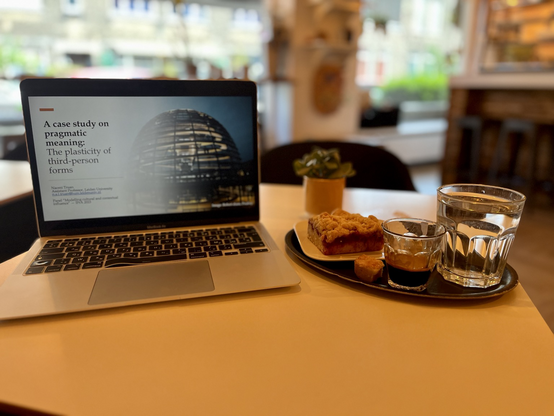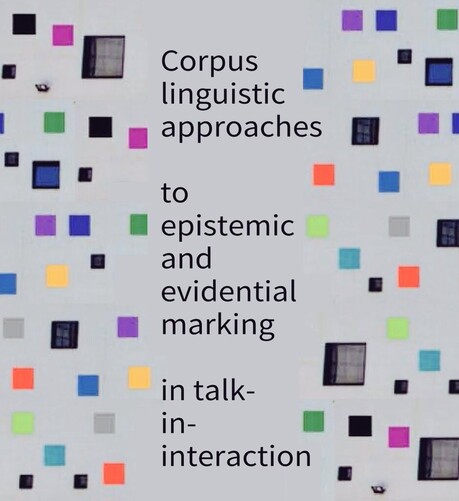Søren Sandager Sørensen · @sorensorensen
284 followers · 357 posts · Server lingo.lolMy #IPrA2023 slides are now available on my website. Scroll to the end for onion cake: https://sorensandagersorensen.dk/pres/2023-07-11%20Interjections%20and%20response%20tokens%20-%20integrating%20functional%20linguistics%20with%20sequential%20analysis.pdf
Eugenia Diegoli (ニア) · @eugenia_diegoli
4 followers · 5 posts · Server sciences.social#IPrA2023 came to a close today. Lot of food for thought, and ofc lot of fun! Big thank you to the organising committee and very grateful for the IPrA bursary that allowed me to attend the conference 🙏
Eugenia Diegoli · @eugenia_diegoli
3 followers · 3 posts · Server sciences.socialGreat panel on first-order pragmatics at #IPrA2023 thanks to prof. Klaus Schneider for having me and to the audience for their great questions and comments. Here a few takeaways from my talk on metadisocurses around #apologies in American English and #Japanese YouTube comment threads
#ipra2023 #apologies #japanese
Søren Sandager Sørensen · @sorensorensen
281 followers · 338 posts · Server lingo.lolAnd now, less than a quarter before the day is supposed to end, we start the final thing for the day: the general assembly #IPrA2023
Eugenia Diegoli · @eugenia_diegoli
3 followers · 2 posts · Server sciences.socialI truly enjoyed Christian Rathmann #IPrA2023 keynote on #signlanguages 🧏♀️ Many insights into conceptual space, language learning/change, creation/negotiation of communication systems, to name a few
Søren Sandager Sørensen · @sorensorensen
281 followers · 337 posts · Server lingo.lolBarbara De Cock · @barbaradecock
95 followers · 51 posts · Server fediscience.orgJust received some good news during #ipra2023. Joint paper out in OA with Aurélie Marsily on "How to start a request : a Contrastive Study of Alerters in Spanish by Speakers of L1 Spanish and L1 French". #Ele
https://brill.com/view/journals/jocp/aop/article-10.1163-26660393-bja10094/article-10.1163-26660393-bja10094.xml?language=en
Eugenia Diegoli · @eugenia_diegoli
1 followers · 1 posts · Server sciences.socialFinalising my presentation for #IPrA2023 on perceptions of the same #apology event in American English and Japanese! More details on Thursday in the panel on First-order #pragmatics by Klaus Schneider 🔥
#ipra2023 #apology #pragmatics
Søren Sandager Sørensen · @sorensorensen
279 followers · 335 posts · Server lingo.lolYou can now download a PDF of my #IPrA2023 slides on the ExOrdo site! See you tomorrow?!
Naomi Truan · @BerLinguistin
866 followers · 618 posts · Server mas.toHere we go! The panel “Modelling cultural and contextual influence: Patterns, templates and schemas in utterance interpretation” is starting with introductory reflections by Frank Liedtke and Elke Diedrichsen on the type of knowledge needed to decipher an utterance. #IPrA2023
Barbara De Cock · @barbaradecock
93 followers · 50 posts · Server fediscience.orgJoin us as at #Ipra2023 on Monday as of 15.45 in Room 09 - UB4.151 for panel "Hierarchies of knowledge in online #health communities" I co-organize with Carolina Figueras, with Heike Ortner, Sarah Bigi (et al.), Anna Tereszkiewicz, Magdalena Szczyrbak, Sofie van der Meij, Jana Declercq, Yue Zhao
Søren Sandager Sørensen · @sorensorensen
277 followers · 332 posts · Server lingo.lolSøren Sandager Sørensen · @sorensorensen
277 followers · 330 posts · Server lingo.lolReady for #IPrA2023 starting today? My talk is on Tuesday 11:30, forming part of the "Integration of conversation analytic and other linguistic methods"-panel. I hope to see you there!
Naomi Truan · @BerLinguistin
864 followers · 616 posts · Server mas.toFinalizing my presentation on pragmatic meaning in parliamentary discourse for #IPrA2023!
Looking forward to seeing old and new faces and introducing baby to colleagues who haven’t met them already 😊
Naomi Truan · @BerLinguistin
864 followers · 616 posts · Server mas.to@dingemansemark I feel you—as a PhD student I would also have never reached out to plenary speakers in advance. But I think it’s a tip that’s been given (I saw it on Twitter and in blog posts), this idea that PhD students should ‘put themselves out there’ in a job market marked by scarcity. I’m looking forward to your plenary on Sunday, by the way! #IPrA2023
outdooracademic · @outdooracademic
161 followers · 224 posts · Server mastodon.social☑️ article submitted
☑️ funding application drafted
☑️ abstract accepted for #ipra2023
hopeful for my new research project on #social #interaction in #heritage #environment|s to finally take off in 2023 🤩
#ipra2023 #social #interaction #heritage #environment
Johanna Miecznikowski · @j_mieczni
111 followers · 12 posts · Server 101010.pl📌#IPrA2023 panel about #corpuslinguistic approaches to #epistemic and #evidential marking in #talkininteraction organized by @jeromejacquin and myself.
Panel contributions:
- Elena Battaglia & Paola Pietrandrea, Incremental and interactive evidential constructions in spoken Italian;
- Jan Fliessbach & Johanna Rockstroh, The placement of wh-objects in French partial interrogatives as a stance-taking device – a challenge for sociolinguistics;
- Mercedes González Vázquez, Interactional uses of evidential markers in Galician;
- Gerda Hassler, French markers of evidentiality in interaction;
- Henrike Helmer & Silke Reineke, Uncertainty vs. dispreference of German "ich weiß nicht": A mixed-methods workflow of a corpus-based interactional linguistic study;
- Ana Keck & Jérôme Jacquin, Expressing a low degree of certainty in interaction: the French epistemic adverb "peut-être" ‘perhaps’ in a corpus of political debates and work meetings;
- Costanza Lucchini & Andrea Rocci, Managing knowledge in financial dialogues: corpus annotation of epistemic modality and evidentiality in earnings conference calls;
- Johanna Miecznikowski, Elena Battaglia & Christian Geddo, An utterance-centered corpus-pragmatic approach to the categorization of information source in spoken Italian;
- Ozan Mustafa & Gustav Kaltenböck, Evidential "last I checked" expressions;
- Flavio Pisciotta, Distribution and function(s) of parenthetical "mi sembra/mi pare" in spoken Italian;
- Clotilde Robin & Jérôme Jacquin, Reportive evidentiality in French-in-interaction: distribution and pragmatic functions of reportive evidentials;
- Stefan Schneider, "J'imagine" as deverbal discourse marker in spoken French. Position in turns and interactions;
- Tanja Trebucchi & Serena Coschignano, Discourse functions of "look" and "see" as evidential and epistemic markers in Italian political discourse: a corpus based study.
Meet you all in Brussels next year 🎉 https://pragmatics.international/page/Brussels2023
@corpuslinguistics
#ipra2023 #corpuslinguistic #EPISTEMIC #evidential #talkininteraction






